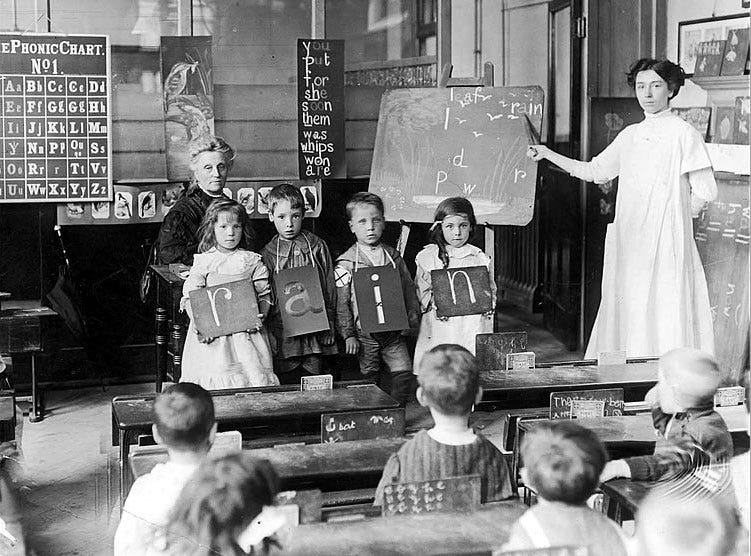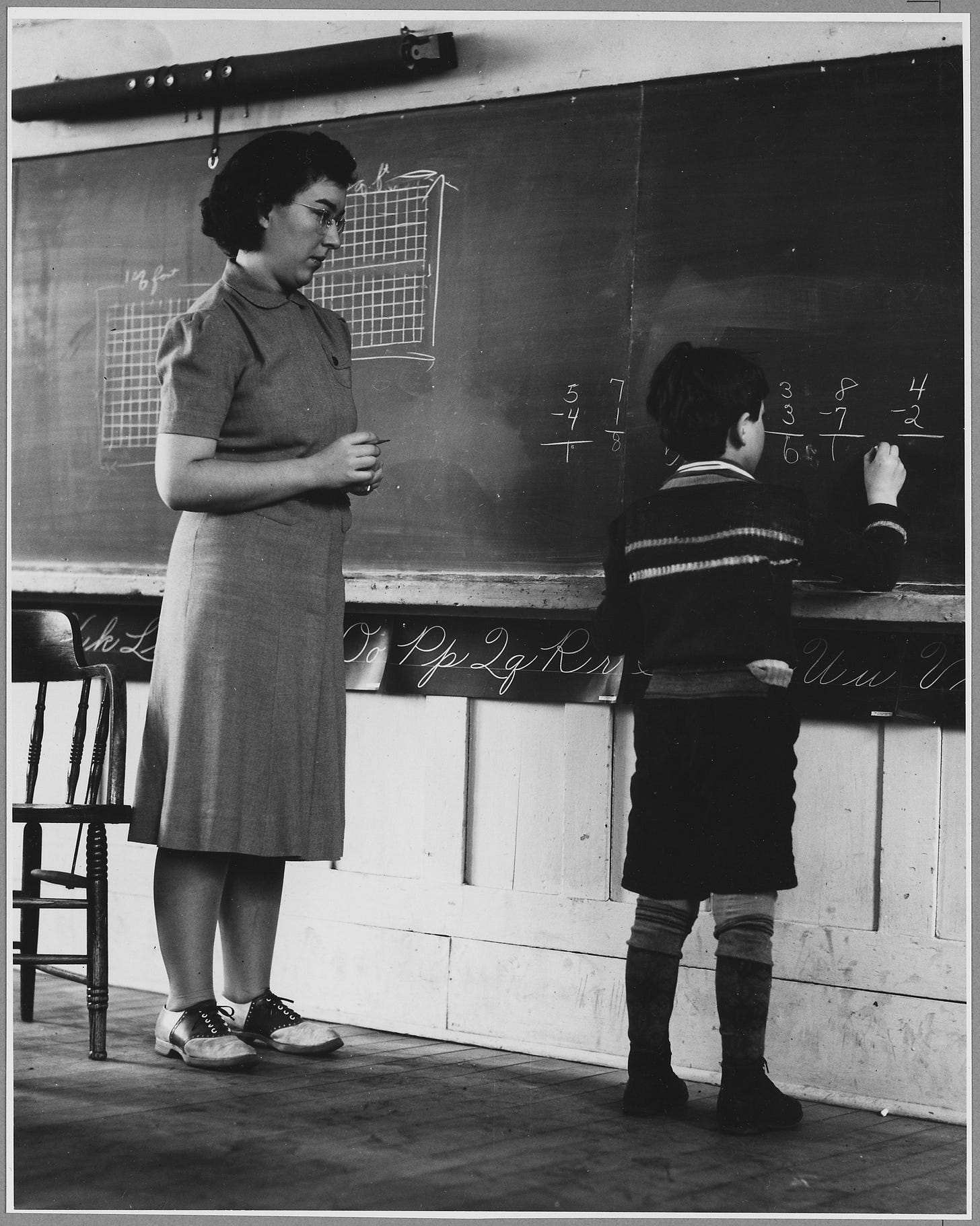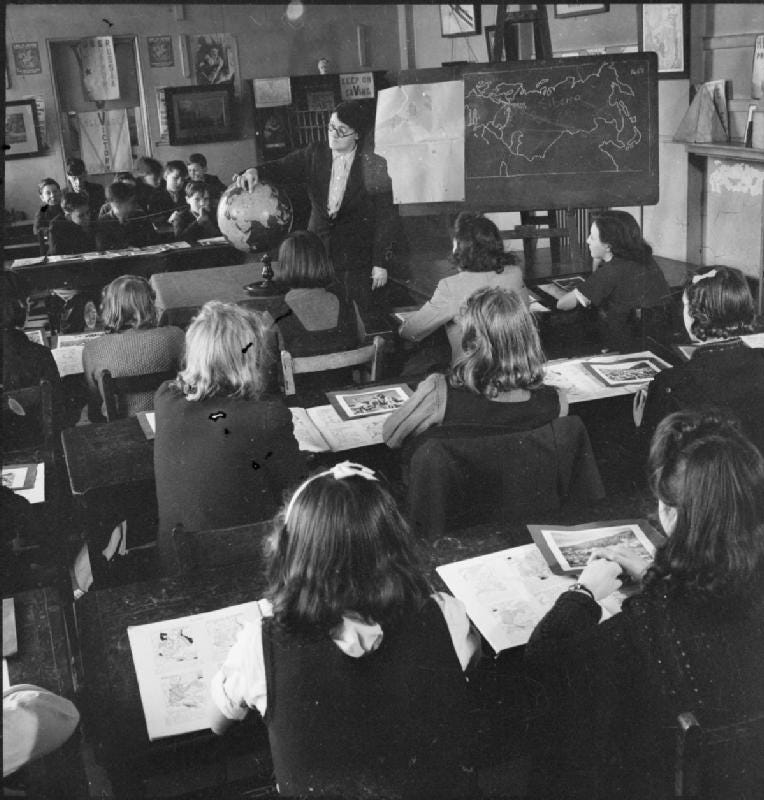Why So Many Public School Employees Send Their Kids Private
The human incentives behind the cognitive dissonance
Many states have recently passed school choice initiatives, raising to contentious levels the issue of how much say parents should have in directing their children’s education. The divide between those who support public schools and those who would expand student options would seemingly create a perfectly bifurcated breakdown of this issue’s supporters and opponents. But surprisingly, many parents find themselves with a foot on both sides of the gap, most notably, those who work in public education yet send their children to private or charter schools.
A teacher and school children study spelling in Chelsea England in 1912. Wikimedia/The New York Times archive.
These parents are in an awkward position—their personal interests align with defending the institution that employs them, but they’re also familiar enough with that institution that they’re not comfortable sending their own kids there.
So the same peculiar thing is repeatedly revealed: a spate of high-profile public-education supporters—union leaders, teachers, advocates, etc.—who are revealed to send their kids to private or charter schools. School choice activist Corey DeAngelo, for example, recently revealed that Sean Denney, the government relations director for the Illinois Education Association, the state’s largest union, was sending his children to private school.
When such hypocrisy is exposed publicly, one is overwhelmingly tempted to view it with schadenfreude; it feels good when people are called out for not practicing what they preach. It’s an understandable impulse, but more importantly, one wonders at the cognitive dissonance those who occupy two distinct positions at once experience.
Sometimes this cognitive dissonance is so loud, one can only assume the person experiencing it is deaf. Chicago Teachers Union President Stacy Davis-Gates, for example, frequently charged private schools with fascism and racism, all while sending her son to a private Catholic school. Then she struggled to defend her choice in the interview she gave with CNN subsequent to these revelations. What is going on?
A teacher at Landaff, New Hampshire's Blue School in 1941. Irving Rusinow, Department of Agriculture. Wikimedia/National Archives at College Park.
The answer is obvious: many public school employees know that there is a stark difference in the attitudes, skills, and outcomes of students who attend private schools and those who attend public schools. This is why they send their kids to private schools in higher percentages than the general public,.
Parents often take a gamble entrusting their local school with their child’s education, safety, and welfare. Violence, as well as the threat of violence, are commonplace in many public schools. Safety is not guaranteed anywhere in life, but the frequency with which teachers and administrators fail at basic safeguarding measures makes the proposition of sending your kid to school frightening.
Safety concerns aside, many public schools fail at their primary function—educating children. The most recent NAEP report card shows that reading and math scores are declining nationwide, . and some schools have zero children who are proficient at math.
Students at Peckham Central School in London learn about Russia from Miss Jones in 1941. Imperial War Museum.
Public school educators and administrators have real experience with the shortcomings, which gives them the data needed to make a rational calculus on where to send their own children. Inevitably, they want their children to attend the best school they can afford to send them, rather than defaulting to the assigned one in their district. They actively deny this opportunity to other families, but this seemingly does not enter into their calculus.
We don’t need to look for nefarious motivations in those with whom we disagree; it is more helpful to view others as people who generally act rationally in pursuit of specific incentives. There is no more powerful incentive than seeing to your own child’s welfare when it comes to the question of school choice. Those most familiar with public education are better positioned to understand that it is irrational, in many cases, to send your child to the local public school, even if you, yourself, are a school employee.
Even if we grant that this decision is rational and understandable, a stark element of hypocrisy remains in praising public education for other people’s children while eschewing it for your own. Rather than continuing to ask other parents to incur public schooling’s risks, public school employees would be more honest by supporting all families in making the same decision they have.





